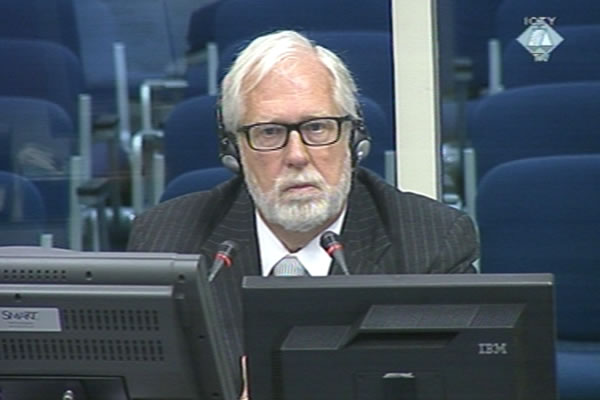Home
DRINA RIVER WAS NOT TO BE THE BORDER
Analyzing the minutes from the Bosnian Serb Assembly sessions, prosecution expert Robert Donia has concluded that the document known as ‘Six Strategic Goals’ envisaged the occupation of those parts of BH with a sizeable non-Serb population and the establishment of a border between the Bosnian Serb state and the territory inhabited by Muslims and Croats, while no border was to be drawn between the Bosnian Serb state and Serbia proper. The goals were conceived by Karadzic, Krajisnik and Koljevic, and implemented by Mladic
 Robert Donia, witness at the Ratko Mladic trial
Robert Donia, witness at the Ratko Mladic trial US historian Robert Donia started his evidence at the trial of Ratko Mladic today. This is the 15th and probably the last time that Donia has appeared before the Tribunal. He was asked by the prosecution to write two reports: ‘Background, Policy and Strategy of the Siege of Sarajevo’ and ‘Key excerpts from the Bosnian Serb Assembly Debates, 1991-1996’.The retired professor from the University of Michigan, who received his PhD for a thesis on the former Yugoslavia, presented his conclusions on the causes, goals and course of the war in BH, with a special focus on the role of the accused Mladic.
In the examination-in-chief, the witness confirmed that he was the author of the report on Sarajevo, while prosecutor Bibles’s questions focused on the excerpts from the Assembly debates. She highlighted in particular the session on 12 May 1992, when the Republika Srpska Army was established, with Mladic as its commander. At the same session, the deputies were shown a document known as ‘Six Strategic Goals’ defining the Bosnian Serbs’ war goals. Since the goals were not formally adopted at the Assembly, the prosecutor showed the Republika Srpska Official Gazette from November 1993, where, as Donia explained, ‘the state officially recognized’ the goals.
The first goal envisages the ‘drawing of state borders’ between the Serb people and the other two peoples in BH. As the witness said, the phrase is not very precise: it is not clear if this goal calls for the drawing of borders between the envisaged states or the separation of ethnic communities along the same borders. Analyzing the speeches of the top Bosnian Serb officials including President Radovan Karadzic before and during the war, Donia concluded that the plan was to achieve ‘a total separation of the peoples’: Serbs were to live in the Serb state, and Croats and Muslims would remain outside these borders.
The remaining five goals define the geographical framework of the Serb state, with the borders on the rivers Neretva and Una, no border on the Drina, the corridor in Posavina, a part of the divided Sarajevo and access to the sea. In order to achieve those goals, the witness explained, the Bosnian Serbs had to place under their control the municipalities where Serbs were in the minority, or which had sizeable Muslim and Croatian minorities. In his report the witness notes that Mladic knew full well that those territories could not be taken without crimes against the Muslims and Croats. He recalled a speech the accused made at the Assembly session on 12 May 1992, when he expressed his concerns about the attempt to take non-Serb areas. Mladic did not mince his words: ‘I don’t know how Mr Krajisnik and Mr Karadzic will explain this to the world, this is genocide, people’.
As he analyzed the lexical aspect of the Assembly speeches, Donia found this was one of the two times when the word ‘genocide’ was used in relation to non-Serbs. The same word was used 12 times in reference to the genocide against Serbs. In his view, the nationalists believed that ‘the ethnic nature and character’ of the Serb people did not allow them to commit genocide.
The witness identified the three leading Bosnian Serb politicians, Radovan Karadzic, Momcilo Krajisnik and Nikola Koljevic, as the key ideologues who defined the strategic goals, and the key man in the field, despite the initial resistance, was Ratko Mladic. Donia agrees that there were ‘tensions and conflicts’ between Mladic and the top politicians, but is convinced that they all worked in concert to implement the same goals. The accused ‘implemented’ the policies designed by Karadzic and his associates. Donia recalled that the accused had stated at several Assembly sessions during the war that he was ‘very committed’ to the realization of the strategic goals.
In the second part of the hearing, Mladic’s defense counsel Branko Lukic began cross-examining the expert.
Linked Reports
- Case : Mladic
- 2013-08-21 ESCAPE FROM CERTAIN DEATH
- 2013-08-20 TERRAIN CLEAN-UP, NOT CRIME COVER-UP
- 2013-08-19 ALMOST 7,000 VICTIMS OF SREBRENICA GENOCIDE IDENTIFIED
- 2013-08-23 MLADIC’S TRIAL ADJOURNED TEMPORARILY
- 2013-08-26 VIOLENCE AGAINST SARAJEVO A ‘PROPAGANDIST CARICATURE’
- 2013-08-27 RATKO MLADIC’S ‘INFLUENTIAL VOICE’
